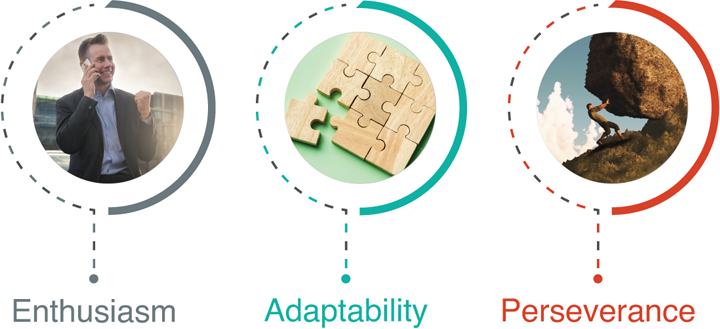It’s no secret that everyone wants to be the CEO. A search for “CEO” on LinkedIn pulls up 8.6 million U.S-based users who claim to hold the title of Chief Executive Officer. Interestingly enough, the Bureau of Labor Statistics reports that there are only 195,530 CEOs in the United States.
Why is it that everyone wants to claim this glorious title? Mostly, it’s because of media sensitization. Every day we hear about how the average CEO among the largest 3,000 companies in the U.S. earns $7.4 million a year. Through television, internet, business news, and every other form of media – we’re constantly shown the glamorous life of some genius CEO that launched a startup and took it public in 2 years.
With so many perks, why would anyone not want to be Director? Ask any successful CEO and they’ll tell you the same answer – because it’s one tough ass job.
Before you change your LinkedIn job position to Chief Executive Officer of XYZ, let’s talk about what the job of CEO really entails.
What is a CEO?
The Chief Executive Officer (CEO) is an organization’s highest-ranking member. They have many responsibilities, but their main focus is to create and implement the company’s strategic vision.
As company leaders, CEOs constantly communicate with internal and external parties including board members, managers, staff, press and media, investors, and more. They set the culture and ensure that the company’s values are established within the organization.
Effective directors are visionaries that look to the future. They put their organizations on a path to success – both in the short-term and long term. They engage in consistent competitive research, align themselves with industry developments, and work persistently to identify expansion opportunities. Using insights gained from their research, they help develop new strategies and monitor the organization’s performance to ensure that goals are met.
What is the Difference Between a CEO and an Owner?

Many people mistakenly equate being the founder of a business to being its CEO. Granted, in many early organizations, the CEO is often one of the founding members. However, being an owner or founder is not a qualification or prerequisite for being the Director of a company.
Hiring experienced executives is expensive, and new startups can’t afford the expense. Instead, these positions are often filled by early owners – even if they have no executive history. As startups begin to bring in investment and expand their businesses, in some cases, C-level members are replaced with more experienced members. Being a founder of a company doesn’t necessarily equate to holding a C-level position.
In established organizations, a CEO is chosen by the board of directors based upon their previous accomplishments and their ability to progress the company forward. CEOs, both owner and hired, can be fired by a board vote. There is an exception though – if the CEO still retains a controlling share of the company, his vote will outweigh the rest of the board.
A successful business may have one founder, but often, there will be several CEO changes over the lifetime of the Company. According to studies, the average tenure for a CEO across all industries is around 8 years.
What are the Qualities of a Great CEO?

The role of Chief Executive Officer is not meant for everyone. It’s an intense job that requires deep commitment and long hours. While the average worker works around 40 hours per week, the average CEO works 62.5 hours per week.
There are several qualities that a Director must possess in order to successfully run an effective business organization. The most important qualities include:
1) Vision:
The CEO must be able to analyze the current and future state of the market to foresee and take advantage of any upcoming opportunities. In some cases, they may be the lone visionary responsible for persuading the rest of the board to see their vision. They are knowledgeable of the customer and their needs, and able to create effective strategies to reach them. In addition, they use their foresight to identify potential future threats and establish plans to quickly pivot the organization to avoid these obstacles.
2) Leadership:
This individual is responsible for leading the entire organization. As the leader, they motivate employees, support teams and individuals, delegate and oversee tasks, and inspire a productive culture – leading by example. As the head of the organization, they often take the most credit for major business successes; however, they also take the most responsibility for the team’s failures.
3) Relationship Building:
CEOs are responsible for building valuable relationships, both internally and externally. They communicate with managers and staff members by listening intensely, asking the right questions, and being open to others’ ideas. As the highest representative of the company, they build relationships with potential partners, investors, media associates, and other individuals and entities that can help progress the business.
What Does It Take To Succeed as CEO of a Startup?

Successful CEOs share many qualities, but their responsibilities may differ based upon the industry they operate in and the business’ maturity level. Startups and established businesses don’t operate the same, and neither do their CEOs. For established businesses, CEOs focus on growing the business, increasing revenues, and gaining a competitive edge. Startup CEOs are usually leading the business from the very beginning, and they must establish these areas before they can expand them.
There are a few qualities that are especially important when leading a startup, including:
1) Enthusiasm
A startup CEO needs to be the ultimate salesman and to make others excited about a product, service, or business, they must possess a high level of enthusiasm themselves. They need to be inspirational, motivational, and able to make others excited about the startup and its potential. When team members feel discouraged, a great startup CEO is able to stimulate them and get them back on a path to success. The entire organization will reflect the CEOs enthusiasm, so if they aren’t motivated for the business to succeed, other staff members will lack motivation as well. When they are enthusiastic about the mission, however, the rest of the organization adopts the same enthusiasm.
2) Adaptability
Early startups are fickle. The CEO and the organization must be able to adapt and pivot quickly and frequently. Effective startup CEOs learn constantly, seek advisement from others, and soak up new information like a sponge. It’s impossible to know how to properly run a business from day one, especially as a first-time startup CEO. The learning curve can be demanding, but a successful CEO reads books, follows industry news, and constantly seeks new information so they will be prepared to make confident decisions.
3) Perseverance
The road from startup to unicorn is a bumpy one and over 90% of businesses fail before they find success. Sometimes it’s unavoidable and the startup simply cannot continue, but other times it’s because the team gave up too soon. Successful CEOs are willing to persevere through hardships and stay committed even when things get tough. Much of the pressure will come down on their shoulders during hard times – investors will expect a turnaround, other members will look to them for direction, and their reputation as a business leader will be on the line. Even when all bets are against them, they must stay focused and continue to move the business forward.
Ready to lead an organization to the top? The first job of a CEO is to create a great business plan. We’ve worked with hundreds of executive teams around the world to develop effective strategies, raise investor funding, and build new products. We’d love to help you too. Contact us to speak to one of our expert startup consultants today!









